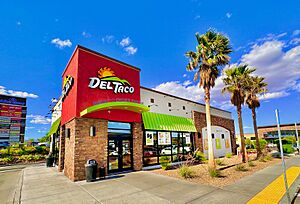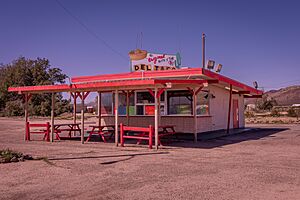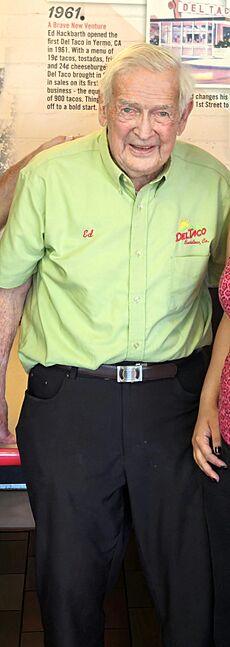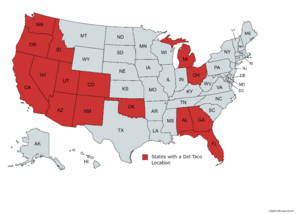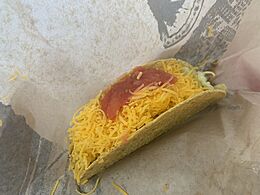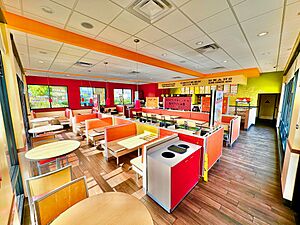Del Taco facts for kids
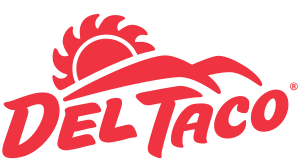
Logo of Del Taco used since September 2022
|
|
| Subsidiary | |
| Industry | Restaurants franchising |
| Genre | Fast food |
| Founded | September 16, 1964, in Yermo, California |
| Founders | Ed Hackbarth David Jameson |
| Headquarters |
25521 Commercentre Drive, Lake Forest, California
,
US
|
|
Number of locations
|
595 as of April 19, 2025[update] |
|
Area served
|
|
|
Key people
|
|
| Products | |
| Revenue | |
|
Number of employees
|
8,000 (2019) |
| Parent | Jack in the Box (2022–present) |
Del Taco Restaurants, Inc. is a popular American fast food chain. It serves a mix of tacos, burritos, French fries, and burgers. Del Taco is currently led by Brand President Tom Rose. Its main office is in Lake Forest, California. In March 2022, Jack in the Box bought Del Taco. Today, Del Taco has about 595 restaurants in 18 states across the U.S.
Contents
The Story of Del Taco
How Del Taco Started in the 1960s
The very first Del Taco restaurant opened on September 16, 1964. It was started by Ed Hackbarth and David Jameson in Yermo, California. Back then, it was called "Casa Del Taco." On its first day, the restaurant made $169, which was a good start!
The first restaurant was so successful that more opened. Soon, there were locations in Barstow, Needles, and Corona. The Corona location was special because it was the first to have a drive-through window. In 1966, the founders created a company to let other people open Del Taco restaurants. This is called franchising. They also created the first sun logo for Del Taco that year. In 1967, they added their famous bean and cheese burrito to the menu.
Growing Bigger in the 1970s
In 1973, the company changed its name to just "Del Taco, Inc." They were opening a new restaurant almost every month! By 1977, there were 50 Del Taco restaurants. Just one year later, in 1978, that number doubled to 100 locations. This shows how quickly the chain was growing.
Changes and Expansion in the 1980s
In February 1989, Del Taco joined with another Mexican fast food chain called Naugles. This merger made Del Taco much bigger. It helped the chain spread to new places, even as far east as North Carolina. During the 1980s, many Del Taco restaurants also started staying open all night.
New Look and Challenges in the 1990s
In 1990, Kevin K. Moriarty became the CEO of Del Taco. His team worked hard to make the brand better and improve the customer experience. In 1992, Del Taco got back the full rights to its name. This meant they could open restaurants anywhere in the U.S. They also launched a big plan to update their restaurants and create a new logo.
The new logo featured a yellow sun over green mountains on a red background. These colors represented the main ingredients in Del Taco food: cheese, lettuce, and tomatoes. Even though they faced some financial challenges in 1993, Del Taco worked to overcome them. By December 1998, Del Taco had 325 restaurants in 12 states.
The 2000s and Beyond
By 2000, Del Taco had 372 restaurants in ten U.S. states. They even made a deal to open restaurants on U.S. military bases. The first one opened at a Naval Air Station in Maryland in 2001.
To improve its image, Del Taco started sponsoring sports teams. They partnered with hockey teams like the Mighty Ducks of Anaheim and basketball teams like the Los Angeles Clippers. This helped them connect with more customers. In 2003, Del Taco announced that their restaurants were doing very well, with high average sales per store.
In January 2008, Del Taco celebrated opening its 500th restaurant in Burbank, California.
Del Taco in the 2010s
Del Taco returned to Texas in November 2010 with a new location in Denton, Texas. They had been in Texas before but left. In 2011, Del Taco also opened four locations in Colorado. They continued to expand into new states like Alabama and Oklahoma in 2013.
On June 30, 2015, Del Taco became a public company. This means its shares could be bought and sold on the stock market.
Recent Years: The 2020s
In October 2020, Del Taco opened its first restaurant in Columbus, Ohio. In September 2021, Del Taco announced plans to expand into Virginia. The first Virginia restaurant opened in Chesapeake in July 2024.
Also in September 2021, Del Taco launched a new rewards program app called "Del Yeah! Rewards." This app lets customers earn points and get special deals.
On December 6, 2021, Jack in the Box announced it would buy Del Taco. This big deal was completed in March 2022. The two companies together now have over 2,800 locations across 25 states. This helps both brands grow even more.
In February 2025, 18 of the 19 Del Taco locations in Colorado closed suddenly. These locations were owned by one franchise group. However, Del Taco corporate has hinted that they plan to reopen in Colorado soon.
Where You Can Find Del Taco
Del Taco has restaurants in 17 U.S. states and one U.S. territory, Guam. As of May 2023, there were 594 locations. Most of their restaurants are in California. You can also find Del Taco in states like Arizona, Colorado, Florida, Georgia, Idaho, Michigan, Nevada, New Mexico, Ohio, Oklahoma, Oregon, Utah, Virginia, and Washington. Las Vegas, Nevada, has the most Del Taco restaurants of any single city.
What's on the Menu
Del Taco's menu has many tasty options, including:
- Hard Shell Tacos
- Soft Tacos
- Burritos
- Quesadillas
- Nachos
- Deluxe Taco Salad
- Crinkle Cut French Fries
- Chili Cheddar Fries
- Double Del Cheeseburger
- Bacon Del Cheeseburger
- Triple Del Cheeseburger
- Shakes
- Fresh House-Made Guacamole
- Dinner Burritos
In April 2019, Del Taco started offering plant-based Beyond Tacos. These tacos use a meat substitute from Beyond Meat. Since then, they have added more vegetarian and vegan items using Beyond Meat. In January 2020, Del Taco launched a new dollar menu with items costing a dollar or less. They expanded this menu in January 2025 with new burritos priced under $3.
Del Taco's Marketing and Mascots
Del Taco has used different ways to advertise over the years. From 1999 to 2000, their first mascot was a character named "Del Taco." This character wore a mask and black costume. However, the company that owns the character Zorro felt it was too similar. Del Taco changed the character and soon stopped using him in ads.
From 2000 to 2006, actor Gregg Binkley played "Dan" in Del Taco commercials. Dan was a funny, clumsy spokesman known for his silly actions while promoting food.
From 2007 to 2008, Del Taco featured "The Beast" in their commercials. "The Beast" was a character who represented hunger. He would try to convince customers to order food to "Feed the Beast," which was Del Taco's slogan at the time.
Later, Del Taco used the slogan "Go Bold or Go Home." Their commercials for this slogan were creative, like one that featured tiny "Mole Men" to promote a spicy chicken taco.
More recently, in June 2018, Del Taco started a campaign to celebrate its employees. Their slogan became "Celebrating the hardest working hands in fast food." They also use the slogan "That's unfreshing unbelievable" to highlight their fresh ingredients.
 | George Robert Carruthers |
 | Patricia Bath |
 | Jan Ernst Matzeliger |
 | Alexander Miles |


